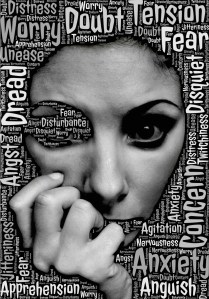
My grandfather had paranoid schizophrenia and bi-polar disorder. Because of this, I felt a need at an early age to study and learn about these mental conditions. I feared, my father and I both, had the same conditions because we described what I perceived to be auditory hallucinations. What I didn’t realize at the time was that we were aware these sounds were not real. Schizophrenics have trouble distinguishing fantasy from reality. I was completely unaware of anxiety as a disorder and was even less aware of my own anxiety. The full scope of symptoms caused by anxiety feels never-ending.
Hallucinations are only talked about under severe situations where people hear voices and lose their grip on reality. With anxiety, hallucinations are labeled simple because they’re often not of a specific thing. Common types of sounds heard by those experiencing simple auditory hallucinations include; beeping, high-pitched noises, random noises, pops, and other unclear noises.
My own experiences include some of the previously mentioned sounds, but also single words that have no meaning. If feels more like echoes of past things I’ve heard. Imagine a ringing in your ears, but instead you hear a high-pitched noise or something like a train whistle.
You can’t imagine the relief I felt when I learned this was a symptom of anxiety. That feeling; however, was bittersweet as I realized so many things in my life that I had no explanation for, or thought was normal for everyone, was actually caused by my anxiety. So much of my life was influenced by anxiety. It makes me wonder how things might have been different. While I am not sure exactly when it started, I’ve had anxiety for a least twenty years. At the time I’m writing this, I am 31-years-old.
Auditory Hallucinations are a cognitive symptom of anxiety. Other cognitive symptoms include confusion, delusions, dementia, detachment, disorientation, forgetfulness, memory problems, and nightmares. If you experience any cognitive symptoms, consult with a doctor as it may be related to something more serious. Never self-diagnose yourself, even if you are a medical or psychiatric physician.
If you believe you’re experiencing auditory hallucinations, remain calm and consult with a doctor before you assume the worst. If you’re aware they are hallucinations, that means you haven’t lost touch with reality. You might ignore it like a ringing in your ears or you’ll assume you need rest. Always consult with a doctor and tell your family, friends, or whomever you have for a support system. There is no shame in revealing that you’re struggling.



